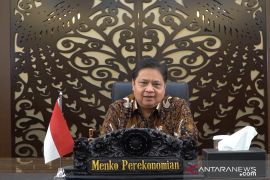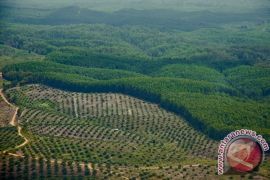"We continue to encourage the downstream palm oil industry and to develop it. The exports of crude palm oil (CPO) have reduced as it was absorbed by the derivatives industries," Industry Minister Saleh Husin explained here on Tuesday.
The minister noted that CPO production had generated US$21.7 billion in foreign exchange from exports in 2014, while the production reached US$18.6 billion in 2015.
The palm oil industry has absorbed six million workers.
"We must continue to develop the industry. CPO has become a strategic sector in Indonesias economic development," the minister remarked.
All stakeholders should find a way to utilize palm oil production, particularly from independent plantations.
"Independent plantations only produce 2.5 tons, which is lower than the production of plasma plantations," the minister pointed out.
The existence of a BLU (public service agency) for palm oil should be optimized to replant palm oil.
"The price of palm oil is not too cheap. The BLU can maintain the price by increasing the absorption of biodiesel," the minister explained.
The absorption of biodiesel should be increased to raise the price of palm oil.
With regard to the French governments policy, the minister affirmed that the country was keen to protect its CPO products. As a result, Indonesias CPO products could not compete with their French counterparts.
Indonesia and Malaysia, the two largest palm oil producing countries in the world, will set up a Council of Palm Oil Producing Countries (CPOPC) to ensure price stability and to develop the downstream industry, according to an Indonesian minister.
The CPOPC will maintain price stability of the commodity by coordinating the production and stocks of palm oil in the global market, Coordinating Minister for Maritime Affairs and Resources Rizal Ramli affirmed.
"The market understands that Indonesia and Malaysia can ensure price stability if they join hands," he emphasized, adding that the two countries control 85 percent of the global palm oil market.
Rizal stated that Indonesia and Malaysia would invite other palm oil producing countries to join the council.
He claimed that the CPOPC is expected to be inaugurated at the end of this month after Indonesian President Joko Widodo met Malaysian Prime Minister Najib Razak.
He noted that the council would also bring harmony in the palm oil production standards based on economic sustainability.
Indonesia and Malaysia will first harmonize the standards of the Indonesian Sustainable Palm Oil (ISPO) and Malaysian Sustainable Palm Oil (MSPO).
"The harmonization will improve the competitiveness of our product," he stated.
Rizal noted that improving competitiveness was important as markets in advanced countries apply high standards to safeguard certain industrial sectors.
"The reason behind such high standards is the motive to protect soybean, sunflower, and other industries," he explained.
Rizal said the initiative to set up the council was an idea that had sprung up a long time ago.(*)
Editor: Heru Purwanto
Copyright © ANTARA 2016











